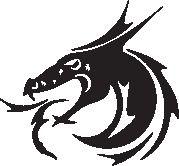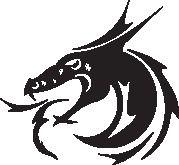The Dragon God (Book 2) (9 page)
Read The Dragon God (Book 2) Online
Authors: Brae Wyckoff

“You said
they
have four of the stones; who are
they
?” Elsbeth asked.
“A mystic from the West Horn, in league with a black dragon.”
“You speak of Veric,” Urlin jumped in.
“That name doesn’t sound familiar,” Raina responded.
“Veric is the brother of Vevrin, King Manasseh’s mystic.”
“Vevrin is now dead. Thanks to my own brother, Dulgin,” El’Korr stated.
“It was known that they were sworn enemies. Vevrin of the North and Veric of the West, but—”
“Go on Urlin. Tell them what you saw,” Elsbeth gave permission.
“We were off the coast of the Singing Rocks. I was testing out a new spell on the upper deck during the night watch, which gave me the ability to see far leagues off, even in the dark. It was there I witnessed two robed individuals off in the distance, standing on the water, conversing.”
Lufra asked, “Wait, you mean they were actually standing on water? How is that possible?”
“Wizards, young Lufra,” Xan responded, “Let us listen. Go on, Urlin.”
“One wore red robes and the other black. I couldn’t make out their faces but it was obvious they were working together, as they concluded with an embrace. They disappeared. I have only shared this with my captain since suggesting such a thing openly would bring certain death, if they were to find out.”
“You are on an isolated ship in the Great Illustrya ocean. What makes you so frightened?” questioned Xan.
With a troubled expression, Urlin continued, “Spies are everywhere, and if one were to overhear my knowledge then I would be silenced quickly, along with everyone else around me.”
“It is alright, Urlin,” Raina acknowledged, “It makes sense now. Veric knew that Manasseh had the knowledge of the fifth stone’s location, so he made a deal with his brother in hopes of Vevrin finding out where it was.”
“What do these stones actually do? We have far more serious issues with the Horn Kings than some rocks,” Skath chimed.
“The Horn Kings will look like a calm day on open seas compared to what will be unleashed on Ruauck-El,” Raina responded.
“Unleashed?” the captain questioned.
“The power of the stones will summon the five dragon spirits and set loose the Dragon God. It will control all the dragons in the realms and reign terror on everyone.”
Raina’s words soaked in and there was a long pause.
Captain Elsbeth stood, leaned forward and said pointedly, “Tomorrow, we set sail.”

“W
hat in orc hell are you thinkin, Bridazak?”
“I don’t know, Dulgin. It just came to me. I believe God gave me this task.”
“This
task
? What exactly does that mean?”
Without answering, Bridazak walked toward the wicker door.
Dulgin snapped, “Where do you think yer off to, ya blundering fool?”
“I’m gonna check on Spilf,” he answered as he left the room.
“Yeah, sure, just leave why don’t ya!”
Abawken stepped in front of the dwarf to take his attention off of Bridazak.
Dulgin’s rant continued, “What’s your stance on this, Huey? You’ve been very quiet at a time Bridazak could use some of that wisdom you like to tell me all about.”
The tall fighter moved to a small window and, because ordakian structures were not designed for the height of humans, bent down to peer through the opening. He turned to the dwarf and motioned him forward, “Take a look.”
Dulgin looked to where he pointed. He saw the tribesmen in the center of the village preparing two wooden altars; one was a simple pile of wood, forming a teepee, obviously meant for Bridazak’s use. The other was an elaborate structure, upon which the women stacked hundreds of tiny skulls; the remains of their children. As they carried out the macabre
ritual, they chanted an eerie song; asking their god to recognize their previous gifts and to bring favor upon them.
“That is why Bridazak is doing what he is doing, and this is why we need to support him more than ever.”

Spilf sat at the lake’s edge and slung flat rocks across the surface. The fog hovered over the body of water and captured each stone the ordakian threw. The sound of the rapid splashes skipping across the surface faded as the crunch of worn pebbles under footsteps approached him from behind.
Without turning his gaze, Spilf said, “This was my home once.”
“We will find your parents, Spilf,” Bridazak responded.
“Do you really think this tribe knows something?”
“I don’t know, but we need to find out.”
“And finding out means challenging their god?”
Bridazak sat next to Spilf, “I think the challenge goes beyond us. These people are lost in their own world and have let something terrible misguide them.”
They both stared out onto Misty Lake and listened to the gentle lapping water hitting the shore.
“This is where my mother pushed me out in the canoe. Why aren’t they here, Bridazak?”
“They must have escaped at the same time you did, and never came back.”
“Do you think this memory energy field caused them to forget about me?
Bridazak paused. “Spilf, they never forgot about you. Even you yourself knew deep down inside that they were out there. I’m sure they remember you.”
“I still have hope, Bridazak. I just thought they would be here.”
“Hope is good. We are going to need some of that real soon.” Bridazak stood up, “I’m going to check on the ‘wood stackers’ as Dulgin is calling them.”
“I love that dwarf,” Spilf smiled; his eyes remained on the lake.

The sun shined brightly when the four heroes stood before the two wooden altars erected for the challenge. A dozen warriors stood shoulder-to-shoulder around each of the structures, humming a low dirge and swaying side-to-side in rhythm. The chieftain, with red stripes painted on his cheeks, yellow on his forehead and nose, orange streaks on his arms, and black tribal markings on his chest and stomach, waited for the appropriate moment and then raised his arms above his head and declared, “Our fathers and oldfathers taught us the ways of our tribe, Yavakai. We will honor them once again in the tradition of Arati, the Flame of the Sky. Our god has never lost. I remind you now of the names who have bowed before our god. Lovakee, Hurroon, Azbon, and Bimola—all were challengers, and all are only spoken now to glorify the mighty Thahaal. Our great sun lord has given us our customs, our ways of life, and our harvest of children to continue to gain his favor.”
Dulgin nudged Abawken, “Too bad we can’t feed this Huey to the monkey we killed and see how he likes it.”
The chief yelled, “Let the challenge of the gods begin!”
His followers immediately shifted from vocalizing the low hum, to uttering a cadence of several repetitive grunts, like thuds of a beating drum. The women of the tribe danced out on the dirt forum and added to the initiated rhythm with high pitched shouts.
Again, the leader raised his hands and the sound dwindled back to shallow guttural grunts. Turning to Bridazak, he began again, “You have challenged our mighty Thahaal and he has accepted. Once the all-powerful Thahaal sets fire to the altar, then the ordakian is to be sacrificed to satisfy Thahaal’s anger.”
Bridazak stepped forward and shouted above the commotion, “When my God smites my wood with fire, then your people will turn from Thahaal and worship my God—and you will never sacrifice innocent life again.”
The chieftain glared and then grudgingly nodded. “Let it be so.”
Two tribesmen grabbed Bridazak by the arms. Dulgin raised his axe and started toward Bridazak and his captors, but Abawken stopped him.
“It will be okay, Dulgin,” Bridazak reassured his friend. “He said He would never leave us nor forsake us. Do you remember?”
The two brutes dragged Bridazak to a wooden pole, a short distance from the prepared altars, and tied his hands and feet. Then they pulled out a dagger and held it to his throat. The cold steel made him flinch.
Spilf held his breath and thought,
“I can’t lose the family I have known in pursuit of the one I lost. How did it come to this?”
Dulgin whispered to Abawken, “If they kill Bridazak, this village will be destroyed with or without your help, so help me God.”
The painted chieftain raised his hands in the air and his subjects began their eerie chant once again. He circled the shrine of wood and children’s skulls.
“Oh great Thahaal, hear us! Oh great Thahaal, send us your fire! We give you thanks for bringing your people to this place. You have surrounded us with your protection in the secret mist; those men who rejected your gift or leave your provision are outcasts never to return, banished, forever separated. You have tested us in this time with shortage of food, but we are faithful to your ways even now! See our offerings and bring your burning judgement on these challengers.” His pleas continued for a long while until the zeal of the dancers and bowing villagers lessened to shuffling and a murmur of unintelligible prayers.
Bridazak’s eyes raked across the village of a desperate people in search of something to ease their suffering, and he felt overwhelmed with compassion for them. The jangle of ornamental animal bones and horns hanging about the village sounded like wind chimes. The old skins the village clothed themselves in were bleached and worn, and, he noticed, repaired one too many times. The cryptic story the chief had told suddenly made sense. Still tied to the post, Bridazak called out, “Everyone! Your Thahaal is the cause of your lack of food. He is the cause of your men who hunt and never return. Can your god not hear your cries?”
The tribal leader shot a menacing glare at the ordakian and then turned back with renewed strength. “Oh great Thahaal, this defiler mocks you and we ask for retribution. You have only taken our men who are not worthy. Send us your mighty power and set this altar ablaze for all to see your greatness.”
Bridazak pleaded, “It is not about power of summoning fire, but instead about providing for those in need. You silently pray in your hearts that he would answer you with food, but he does not come. Why? Where do your prayers and sacrifices go?”
Dulgin turned to Spilf, “Be ready, Stubby. Our fearless leader is riling this Chiefy up and I expect trouble soon.”
“Yeah, that’s what’s scaring me. What is he doing?”
The sun had blazed through the day, but now it steadfastly dipped lower in the horizon. With no godly response from Thahaal, the chanting song barely dwindled on, but it had lost its fervor.
Bridazak began again, “Don’t lose heart, Yavakai tribe! The true God of everything has heard you, and will answer you with the return of the elkhorns,” Bridazak smiled reverently, compassion in his eyes.
A scream of utter rage came from the chieftain. He fell to his knees while lifting his arms in worship of his deity. His tribe also followed his lead and began shouting. Their cries echoed through the village in audible waves, undulating in tones from low-pitched groaning, to high, emotional screeches.
Bridazak noticed others within the congregation exchanging glances to one another and he pressed on yelling above the chant, “How did I know of the elkhorn herds vanishing if not told by my God? I don’t understand why your deity does not answer you.”